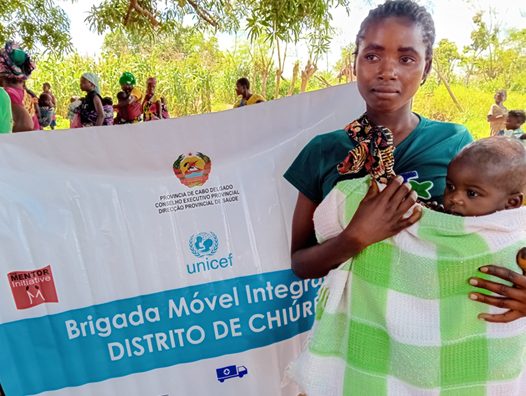Two mobile clinics staffed by specialised integrated health teams are working with community health workers and volunteers in Chiure District, Cabo Delgado to deliver essential health and nutrition services to communities furthest from facilities.
Severe chronic malnutrition affects one in two children between 6 and 59 months in Cabo Delgado, Nampula and Niassa Provinces. Malnutrition cases rose sharply following the armed conflict and natural disasters that have devastated northern Mozambique in recent years.
This data from the Nutrition Cluster survey in 2024 means that half of all young children are at risk of developing health complications such as pneumonia, diarrhoea and malaria, drastically increasing mortality and morbidity in this age group.
MENTOR is working with the Provincial Health Directorate of Cabo Delgado, supported by UNICEF, to strengthen the health system and improve access to important health services.
Over the past nine months, more than 100,000 children have been screened, of which 1,600 received treatment and 38,000 received ready-to-use therapeutic food for six months.
Jacinta José (pictured) came with her one-year-old daughter Anatércia Eduardo to the mobile brigade in the Samora Machel locality to be vaccinated. After Anatércia was weighed and measurements had been taken, Jacinta was informed her child was not gaining weight and was very thin.
Jacinta said: “I was given medication and told to give her one packet a day. I was also taught to prepare porridge with peanuts, moringa, oil and sugar, and not to let the child go too long without eating.
“Three weeks after I started giving the medicine, I noticed changes. When I carry my daughter, I feel she’s heavier. Compared to before, she now reacts better to stimuli, is more active and plays with some objects in the house.
“The mobile brigade is a very good thing. Illnesses are treated right here in the community. When we go to the hospital, we suffer a lot: we walk long distances, we leave early and without food, and we also face long queues. So sometimes we only take the children to the health centre when they are visibly ill. Here, with the brigade, the child is seen on time, and we can still do other chores at home.”
- News
Mobile clinics deliver health and nutrition services in Cabo Delgado
- Kathryn Johnson

